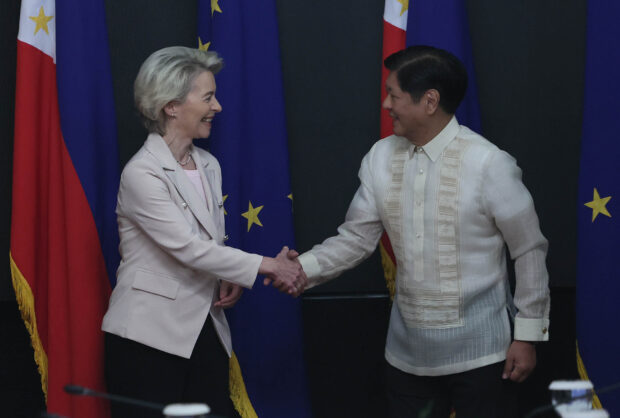EU ready to bolster security ties with PH

PARTNERS | President Ferdinand Marcos Jr. (right) describes the Philippines and the European Union, as represented by European Commission President Ursula von der Leyen, as “like-minded partners” through “shared values of democracy, sustainable and inclusive prosperity, the rule of law, peace and stability, and human rights.”—MARIANNE BERMUDEZ
MANILA, Philippines — The European Union is “ready to strengthen cooperation with the Philippines on maritime security,” the head of the organization’s executive branch said on Monday when she arrived in Manila for bilateral talks with President Ferdinand Marcos Jr.
In a joint press briefing with Marcos on Monday morning, European Commission President Ursula von der Leyen said: “Today, I’m here to accelerate a new era of cooperation between us. We share so many values and interests. We both want to work toward strengthening our democracies. We believe in the international rules-based order and we believe in the need to promote and to defend it.”
She tackled, in the following order, the areas of trade, climate change, digital connectivity, partnership on critical raw materials, and security — in which “it [has made] sense to strengthen our ties across the board,” she said.
“We are ready to strengthen the cooperation with the Philippines on maritime security in the region by sharing information, conducting threat assessment, and building the capacity of your National Coast Watch Center (NCWC) and your Coast Guard,” von der Leyen said.
The NCWC is the implementing arm of the National Coast Watch Council, an inter-agency body on maritime security chaired by the executive secretary.
The EU leader also emphasized the importance of security cooperation not only in Europe but in the Indo-Pacific region—as another European body, the North Atlantic Treaty Organization, has also asserted time and again.
“Security in Europe and security in the Indo-Pacific is indivisible. Challenges to the rules-based order in our interconnected world affect all of us. Our societies pay through higher energy bills through higher food costs. This is why we are concerned about the rising tensions in the Indo-Pacific,” von der Leyen said.
Russia, China
“The European Union has been very supportive of a free and open Indo-Pacific, because an Indo-Pacific free of the threats of coercion is key to all our stability, to our peace, and to the prosperity of our peoples,” she added.
At Malacañang, von der Leyen also took the occasion to cite Russia’s “war of aggression against Ukraine” and affirmed the EU’s support for the 2016 arbitral ruling in the Philippines’ favor.
The ruling by the Permanent Court of Arbitration on the arbitral case brought by the Philippines in 2013 invalidated China’s sweeping claim of sovereignty over the South China Sea, including the West Philippine Sea within the Philippines’ exclusive economic zone.
Later addressing the Philippine Business Forum on Monday night, von der Leyen said China, as a member of the United Nations Security Council, had “yet to assume fully its responsibility under the UN Charter to uphold the sovereignty and territorial integrity of Ukraine.”
“This is happening against the backdrop of China’s more assertive stance in your region,” she also said in her remarks posted on the European Commission’s website.
Talks on trade
To her audience with Marcos, von der Leyen said the EU can do so much more “as your fourth largest trading partner,” as she noted the revived negotiations for a free trade agreement (FTA) between the EU and the Philippines.
The talks were originally launched in 2015 — with the aim of concluding a deal that covers tariffs, nontariff barriers to trade and intellectual property — but were stalled two years later, as relations soured, amid the EU’s concern over the drug war of then President Rodrigo Duterte.
“A free trade agreement has huge potential for both of us in terms of growth and in terms of jobs,” von der Leyen said. “We need to diversify our supply lines and make them resilient… An FTA is the basis for that. But it’s also much more. An FTA can be a springboard for a new technology cooperation to modernize the broader economy.”
Marcos, who began their press briefing, also cited the talks on the FTA as well as the 60-million-euro Green Economy Program in the Philippines grant, aimed at supporting the country in such areas as renewable energy and climate action. (See related story on this page.)
He also thanked the European Commission “for their decision to extend the recognition of STCW (Standards of Training, Certification, and Watchkeeping for Seafarers) certificates issued by the Philippines,” saying this ensured the employment of over 50,000 Filipino seafarers working onboard EU-flagged vessels.
“During our meeting, we discussed the economic relations with particular focus on revitalizing trade between our two regions,” the President said, adding that “the Philippines and the EU are like-minded partners through our shared values of democracy, sustainable and inclusive prosperity, the rule of law, peace and stability, and human rights.”
First visit
Von der Leyen’s visit to the Philippines marks the first by the president of the European Commission, as she herself pointed out to Marcos.
The first woman to head the European Commission, von der Leyen was a practicing physician before she entered politics and public service, following in the footsteps of her father. She was also the first woman to head Germany’s Defense Ministry.
As both leaders recalled in their press briefing, Marcos first met with von der Leyen at a summit in Brussels between the EU and the Association of Southeast Asian Nations in December last year.
